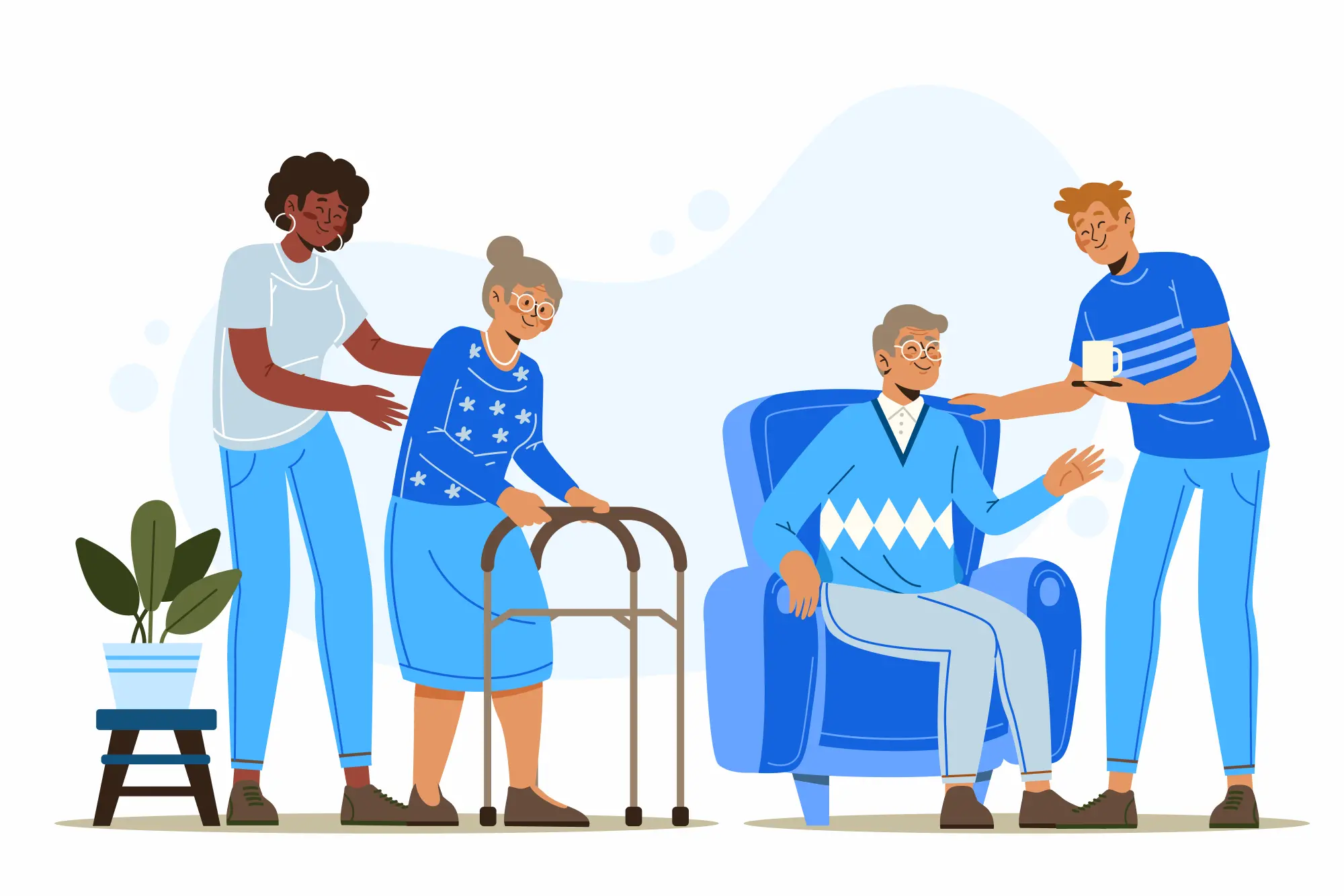No products in the basket.

Introduction
Do you want to get your workers up to speed on the Care Certificate? It might be a difficult and time-consuming procedure, but it doesn’t have to be! With the correct expertise and tools, you can make acquiring the Certificate of Care easier for you and your staff.
In this blog article, we will review the processes needed to make the Care Certificate journey as easy as possible. As they address frequently asked questions concerning the Certificate of Care. So let’s get started! Are you working on a care certificate? If this is the case, you may feel stressed by the journey. You must answer several questions, complete tests, and develop strategies. Thus, to ensure your personnel understand the significance of the Certificate of Care.
This blog article will teach you how to make the care certificate journey easier for you and your staff by giving helpful ideas and tools. Understanding the answers to the Certificate of Care questions and how to successfully teach your personnel. Thus, it may make completing the care certificate much smoother.
What is the care certificate?
The Care Certificate is a collection of requirements that healthcare and social care employees must fulfil to demonstrate. That is an awareness of their duties, responsibilities, and abilities. It got its start in 2015 as a tool for businesses to ensure that their personnel have the knowledge, skills, and understanding essential to provide excellent patient care. The Care Certificate comprises 15 standards organized into three modules: introduction, values and principles, knowledge, skills, and comprehension. All healthcare and social care personnel must have the Care Certificate. That undergoes evaluation through online learning, tests, and practical observation.
Completing the Certificate of Care ensures professionals are current on industry best practices. As a result, healthcare providers and organizations must ensure that all staff participate in the care certification process. Employers can promote a successful care certification workplace by ensuring that resources are accessible to help each employee’s journey. They should also conduct training sessions or seminars so that everyone understands what they need to do to properly achieve the Care Certificate. Employers should encourage employees to collaborate on projects, as cooperation may frequently result in quicker outcomes.
Regular meetings with team members receiving care certification should also be systematic to assess progress and any issues they may be encountering with obtaining the Care Certificate. This will make the entire process easier for everyone involved.
Why is the care certificate important?
All health and social care practitioners must have the NHS Care Certificate in order to provide safe, compassionate, effective, and high-quality care. The care certificate certifies that the individual has completed a set of established standards of care means. Hence, to provide them with the knowledge, understanding, and abilities to provide the best possible care for individuals in their care. Employers value the care certificate because it proves that staff have the skills and knowledge to conduct their jobs effectively. It is a legal duty for all businesses to ensure that their staff have completed the NHS Care Certificate, and employers should consider this as part of their recruiting process.
Additionally, companies must guarantee that their employees receive frequent refresher training to keep their knowledge and skills current. Employers may be certain that their employees have the essential credentials, expertise, and abilities. So that to provide the best possible care for individuals in their care if they hold the Care Certificate. As a result, companies should ensure that all new hires get suitable induction training, followed by continuing refresher training. To ensure that the knowledge and abilities earned via the NHS Care Certificate remain current. Employers should ensure that staff members who have achieved the NHS Care Certificate get suitable recognition for their efforts and provide proper induction and continuous refresher training. This might be a unique award or recognition on business websites or intranet sites.
Finally, employers should evaluate the Care Certificate regularly to ensure the information remains current and updated with any new developments or changes in legislation or policy. This will assist in sustaining quality assurance inside healthcare organizations while improving patient safety and satisfaction.
Why Was the Care Certificate Developed?
The Care Certificate came into being in response to rising concerns about the quality of care provided in the United Kingdom. It exists to ensure that care staff have the essential knowledge, talents, and values for their employment, resulting in a safer and more efficient care environment for employees and persons getting care.
The Care Certificate is part of the National Minimum Training Standards for Health and Social Care Workers in England, which the Department of Health established in 2015. The criteria aim to ensure that all new healthcare workers receive adequate training and possess the necessary skills and knowledge to provide quality treatment.
The Certificate of Care establishes requirements that must be satisfied before care personnel can be considered completely competent.
The Care Certificate satisfies the needs of organisations that have a duty to offer proper employee training as well as the concerns of those receiving care. It ensures that everyone in a healthcare setting has the necessary skills, knowledge, and values to accomplish their job successfully and safely. This eventually leads to better results for people getting treatment and improved connections between healthcare workers and those they serve.
The Care Certificate addresses issues such as what sort of training should be provided to care employees and how to effectively assess whether or not they have acquired the requisite level of competence. It also includes communication, cooperation, infection control, health and safety, equality and diversity, legal obligations, and basic life support.
Furthermore, it outlines how to assess competency and document evidence of learning gained during the Care Certificate process. These criteria help ensure caregivers provide safe, high-quality care that meets expectations.
Care Certificate Standards
The Certificate of Care consists of 15 standards:
Standard – 1: Understand your role-
A job description may be unable to describe every task you will perform, but it should provide a solid general picture of your work. Your job description may include the following duties:
- Providing care and support, working in a person-centred manner, communicating effectively, creating connections, and encouraging equality and diversity.
- Working as part of a team, being a helpful team member, and honing your talents to better your work.
- Contributing to activities safely, preserving and filing clear records, keeping to rules, and adhering to the agreed-upon procedure for operation.
- Respect confidentiality by not disclosing personal information about persons or employees to unauthorised individuals and securely maintaining records.
The abilities and competence vital to execute your position correctly, as well as how you should operate, are set at the national level.
Standard – 2: Your personal development-
A personal development plan (PDP) is an action plan that will assist you in becoming more organized. It identifies learning and development requirements to assist you in performing your work more effectively. Most PDPs are valid for a year and should be updated and renewed yearly.
Standard – 3: Duty of care-
You are responsible to everyone who receives care and assistance in your company. This contributes to well-being and ensures individuals are safe from violence, abuse, and injury.
Standard – 4: Equality and diversity-
Equality and diversity are important aspects of modern life. To offer care and assistance that fits the requirements of everyone, you must understand the meaning of these phrases and incorporate them into your work.
Standard – 5: Work in a person-centred way-
Whether conscious of it or not, we all spend our daily lives guided by values that define how we think and respond. Values are views and concepts about how people should behave that we have acquired from our childhoods, families, backgrounds, cultures, educations, relationships and faiths. While we each have our own beliefs, some are essential for working in health and social care.
Standard – 6:Communication-
Good communication expands your knowledge and understanding of persons and the roles of other professionals, allowing you to give the greatest support and care possible. It aids in the development of working relationships in which everyone’s perspectives have meaning and are subject to account.
Communication is important to a caring connection since it fosters trustworthy relationships with coworkers, family, and the people you care about. Communication is important to a caring connection since it fosters trustworthy relationships with coworkers, family, and the people you care about.
Although talking is commonly seen as the most prevalent technique, most communication is quiet. Gestures, tone of voice, grins, grimaces, shrugs, nods, moving away or closer, and crossing arms and legs tell us considerably more than words. Learning to account for these emotions is part of improving your communication skills. Communication can be more difficult when we can’t see these cues, such as using the phone, texts, or email.
Standard – 7: Privacy and dignity-
When providing care and support, two crucial values to consider are:
- Privacy: Giving someone space where and when they need it.
- Dignity: Recognizing the worth of each human, including:
- Respecting their opinions, choices, and judgments
- Not making assumptions about how people want to be treated
- Working with compassion and caring
- When feasible, communicate with the individual directly.
Individual safety and well-being are essential. You should get to know each individual as well as possible, including their background, thoughts, wishes, likes, and dislikes. Always give individualized care and assistance that places the individual at the centre of their care. You should give them as much independence as possible while respecting their privacy and dignity.
Working in this manner decreases the possibility of an individual being treated in a demeaning or harmful way.
Standard – 8: Fluids and nutrition-
What we eat affects our health and wellness and how we appear, feel, and operate. Individuals must consume a diet that is safe to consume and contains all of the nutrients they require. When preparing and handling food, food safety is crucial.
Some chemicals and items that might cause injury or disease are not visible. This implies that people might feel unwell after consuming food that appears to be safe and tastes normal. Whether you make a sandwich for someone on occasion or frequently take part in meal preparation, you should always check that the food is safe to ingest.
Food must be prepared and kept in ways that prevent it from getting contaminated with items that might cause injury or sickness. Food dangers include Physical, Chemical, Allergenic and Bacterial.
Standard – 9: Awareness of mental health, dementia and learning disability-
This standard intends to make you aware of people’s experiences with, and the causes of, mental health disorders, dementia, and learning disabilities.
While you may not be directly supporting people with mental illness, dementia, or learning impairments, all health and social care professionals must be aware of these diseases. This is performed to verify that any indications and symptoms you detect are communicated to other workers. You exhibit compassion and understanding when you encounter behaviour that is difficult to comprehend or respond to. If your organization offers care and assistance to people suffering from mental illnesses, dementia, or learning difficulties, it should offer. further specialized training.
This will assist you in expanding your knowledge and developing your skills and abilities to fulfil the requirements of your position. It might involve the possibility of pursuing specialized certifications. For further information, contact your manager.
Standard – 10: Safeguarding adults-
Adult safeguarding is defined under the Care Act 2014 as protecting an adult’s right to live safely, free from abuse and neglect
Safeguarding entails people and organizations working together to reduce the risks of abuse or neglect and the experience of such abuse or neglect. Safeguarding strikes a compromise between the right to be safe and the right to make informed decisions while promoting the adult’s well-being. This entails considering the person’s opinions, wants, feelings, and beliefs before deciding. Health and social care organizations have certain tasks, but all employees have a role.
Standard – 11: Safeguarding Children-
Child protection and safeguarding are everyone’s responsibility: it is not just the job of childcare professionals to promote the well-being of children and protect them from harm.
When you come into touch with children in your day-to-day employment, you are responsible for ensuring their safety.
Please remember that the phrase ‘child/children’ throughout this workbook refers to any kid or young person under 18.
Safeguarding is a preventative measure that involves supporting the well-being of children by safeguarding them from harm and recognizing the threats to their safety and security.
Child protection is the action of protecting children who are suffering or are at risk of experiencing serious harm as a result of abuse or neglect.
Standard – 12: Basic Life Support-
The information in standard 12 provides knowledge about the administration of basic life support.
You should also be provided with practical training by your employer to be able to put the knowledge from this workbook into practice to be able to carry out basic life support competently.
The following are the components of basic life support:
- Initial assessment.
- Airway maintenance and breathing.
- Cardiopulmonary Resuscitation (CPR).
Standard – 13: Health and Safety-
The primary goal of health and safety laws is to safeguard workers and others impacted by work activities.
Standard – 14: Handling information-
Information should always be shared only with those who need to know, such as other personnel involved in the individual’s care. Without the individual’s consent, you should not disclose any information to anyone else, including relatives or friends. For example, a person may not want a friend to know about their health or if they have been sad. It is also critical to secure sensitive information from unauthorized access or listening. For example, if you met another worker to talk about your employment, you should consider whether others may hear you or whether a personal letter to an individual was left in a public area where others could read it.
You protect an individual’s personal information as a health or social care provider, and you protect an individual’s personal information. Personal information about other workers you can access should be treated similarly. Your employer must have mechanisms to satisfy the legal requirements for information storage, and you must follow your company’s agreed-upon working methods. Request that your employer walk you through the information-protection mechanism at your job.
Standard – 15: Infection prevention and control-
Infection and infectious diseases in humans occur when hazardous germs (pathogens or pathogenic microbes) enter and grow in the body. These bacteria are so small that they can only be seen using a microscope.
Unlike other diseases such as heart disease and diabetes, infectious disorders can spread from person to person. As with other ailments, prevention is preferable to treatment.
Each standard in the Care Certificate includes assessment criteria that outline the knowledge, understanding, and abilities required of employees. Some assessment criteria have to do with knowledge, while others are anxious about performance and can only be examines in the workplace.
How can you make the care certificate process easier for you and your employees?
The Care Certificate is essential to your workers’ growth and awareness of their jobs within your firm. As an employer, you must ensure the procedure is as simple as possible so your employees enjoy a stress-free experience. Here are some pointers to help you and your workers with the Care Certificate process:
- Have all the necessary documents ready: Before you start, double-check that you have all of the papers needed for the Care Certificate. This includes contracts, agreements, job descriptions, rules, guidelines, and training documents. Having this information on hand will assist in guaranteeing that everything works well.
- Provide adequate training to your employees so they understand what is expected of them as they begin their Care Certificate journey. You should also explain the objective of the Care Certificate and the benefits of completing it for them.
- Make the assessment process easier: When evaluating your employees, make the procedure as simple as possible. Give them plenty of feedback so they know what they need to accomplish to pass each job. This will make students feel more confident and driven to obtain their Care Certificate.
- Encourage employee feedback: Request input from your staff throughout the process so that you may make the required changes. This will ensure that everyone engaged in the process is pleased with the result.
- Offer rewards for completion: Consider rewarding people who complete their Care Certificate with a certificate or gift voucher. This will demonstrate to your staff how much you appreciate their hard work and devotion.
How Do You Complete the Care Certificate?
The Care Certificate is an online qualification that must be completed within a specific deadline. To get the Certificate of care, your staff must complete several activities such as online examinations, quizzes, practical exercises, and case studies. They will acquire their formal certification once these components have been completed.
Knowledge about Healthcare
An effective healthcare system can affect a nation’s economic growth, industrialization, and development. Health care has been seen as a key factor in promoting people’s general physical and mental health worldwide.
One instance of this was the deliberate use of healthcare interventions to eradicate smallpox globally in 1980.
Global healthcare systems control and avert many illnesses, including AIDS, malaria, and TB.
As a result, healthcare systems play a crucial role in many nations’ attempts to achieve economic and social development and protect people’s lives worldwide.
Summary
The Care Certificate is a set of requirements that adult social care professionals. The healthcare support workers in the United Kingdom must complete to demonstrate. That they have the essential skills and knowledge to deliver safe and effective care. The certificate goes to those who complete a training programme and pass an evaluation on 15 categories, including communication, personal growth, and information management. The Care Certificate is vital for all new care employees. Hence, it aims to ensure that they have the skills and information to provide high-quality care to patients and consumers.
Did we miss anything? We want to make this article a comprehensive list of problems and solutions with traffic sources. If you know of something we missed, let us know with a comment below; we appreciate the input.
FAQs
What do employers have to do?
You should give a systematic introduction in which you educate the new staff members on the information they need and provide them with a structured experience in the workplace. Thus, to allow them to satisfy the requirements outlined in the Care Certificate. This is so they can offer the fundamental levels of care required by their profession. Thus, you may show documentation of their competence for inspection reasons.
What happens if employees don’t meet the standards in the Care Certificate?
Employees should not work independently unless they have met the necessary criteria. Employees can be signed off on individual standards and work alone in the relevant area. However, this isn’t a good idea because the standards work best as a reliable indicator of competence when to think about it altogether. The employer is responsible for maintaining worker competency. Moreover, they must determine if completing the criteria is part of their probationary requirements (if these are part of the employment contract).
Do temporary workers/bank staff need the Care Certificate?
Care Quality Commission (CQC) regulated providers must examine the training needs of all new employees. This includes agencies, banks, and directly hired healthcare support and care workers.
The regulated provider, not the recruiting agency, is completely responsible for the training and quality of service a temporary worker gives. Whether covering for several months or one shift.
How is the quality of the Care Certificate assured?
Healthcare practitioners are responsible for keeping individuals safe and meeting their health and welfare requirements. They must ensure that their staff are capable of doing their jobs and that they receive adequate instruction, observation, and assessment.
Employers are responsible for ensuring the quality of training and assessing the Care Certificate. Employers must apply the standards to ensure that their employees receive the appropriate training to gain the knowledge and competencies required to deliver safe and compassionate care of the highest quality.
Possession of the Care Certificate will be one piece of evidence they may require to make that choice. However, companies will naturally want to learn more about their new employees and what extra training and assistance may be necessary.
Can E-learning/workbooks/films be part of the Care Certificate training delivery?
Yes, however, these training methods cannot adequately prepare you for the Certificate of Care.
E-learning, workbooks, and DVDs can all be effective methods for covering different aspects of Care Certificate study, and a combination of all methods can be beneficial. The Certificate of Care comprises abilities that must be evaluated in the job. The Care Certificate Framework clarifies matters further.
Can Individual Employers and Personal Assistants use the Care Certificate?
Yes. Individual employers that want to use the Care Certificate to hire personal assistants can do so. Because individual employers aren’t subject to the Care Quality Commission (CQC), utilising the Care Certificate to support the introduction of new personal assistants is totally optional.
The amount of Care Certificate training, supervision, and workplace evaluation an individual employer can do depends on their training and expertise. On the other hand, individual employers can hire external learning providers to help with this process.
Do voluntary workers need the Care Certificate?
Their amount of experience, job, and duties will decide this. The duties of volunteers in adult social care organisations can vary. Where their duties are limited, the employer can simply deliver the essential Care Certificate points in conjunction with other introductory training.
Suppose the volunteer performs the same activities as any other care worker. If the volunteer is new and has never worked in the health or adult social care sector, the whole Care Certificate must be complete. If the volunteer has prior expertise, the organization should verify their credentials and analyze their capabilities.
Do ancillary support and other non-care workers within adult social care organisations have to do the Care Certificate?
The Care Certificate exists for all adult social care organisation employees to finish simply a portion of it.
Receptionists, porters, chefs, kitchen workers, drivers, cleaners, finance clerks, and other health or adult social care organization employees are exempt from completing the Care Certificate.
Some components of the Care Certificate can possibly be to think about relevant to the employer’s position. (for example, the company may require all staff to attend Safeguarding Adults and Children awareness training). Similarly, if suitable for the position of support staff member, the employer’s introduction would include crucial training such as health and safety, aiding and moving, and so on.
If someone has Level 2 or Level 3 Diplomas in Health and Social Care, should they do the Care Certificate?
The qualification will have covered part but not all of the Care Certificate. Employers should utilise the Mapping Document and Self-Assessment Tool to identify gaps and plan any required training and workplace assessments.




















